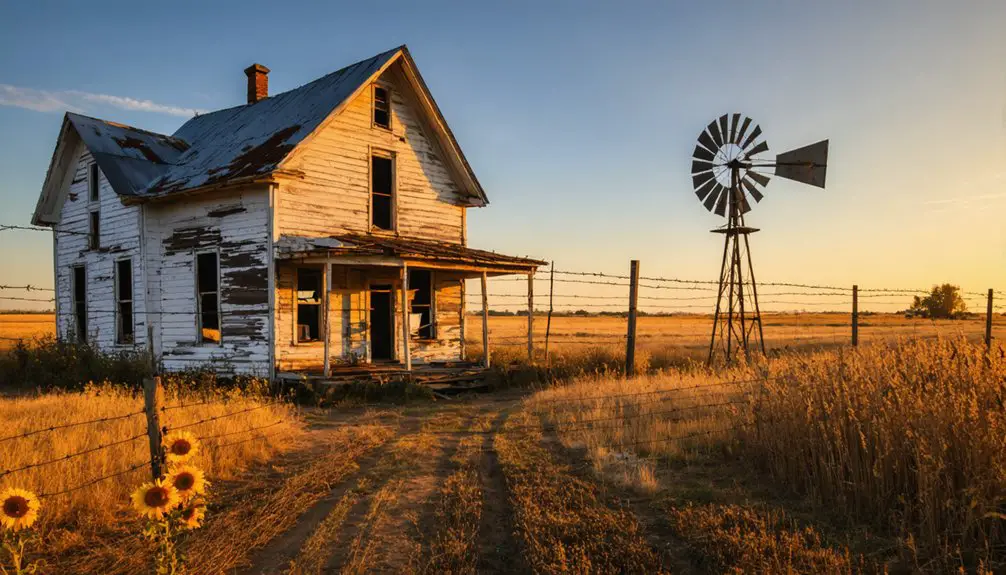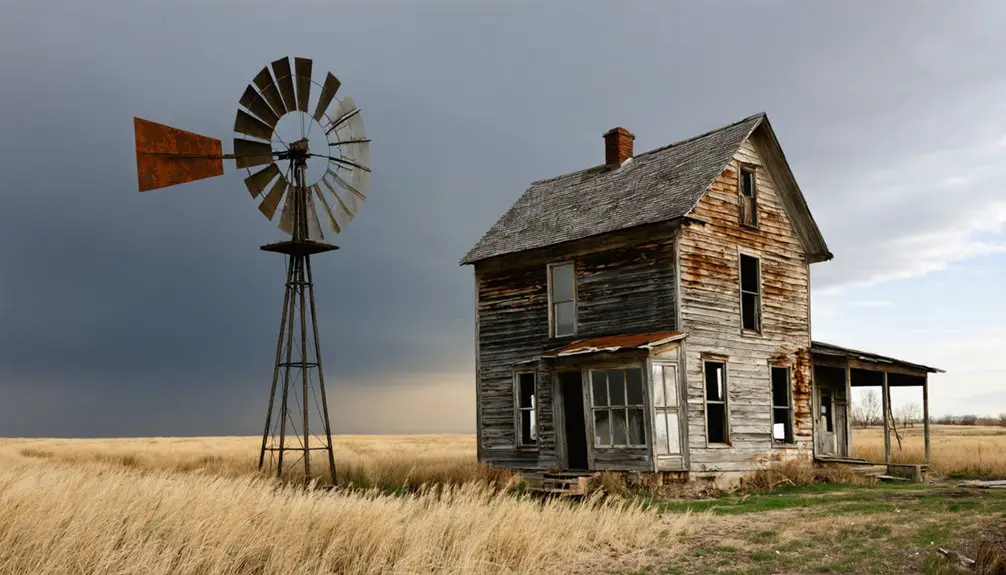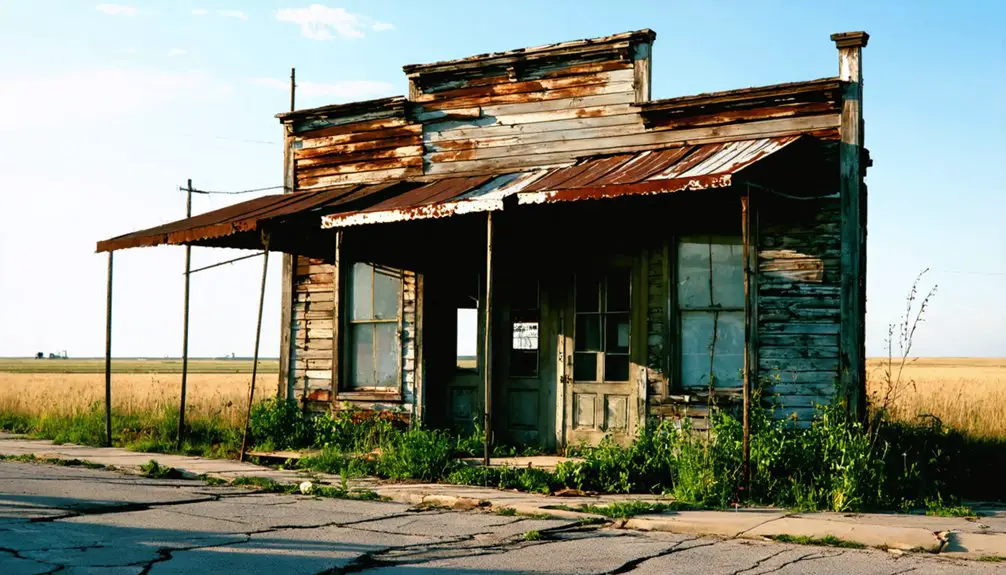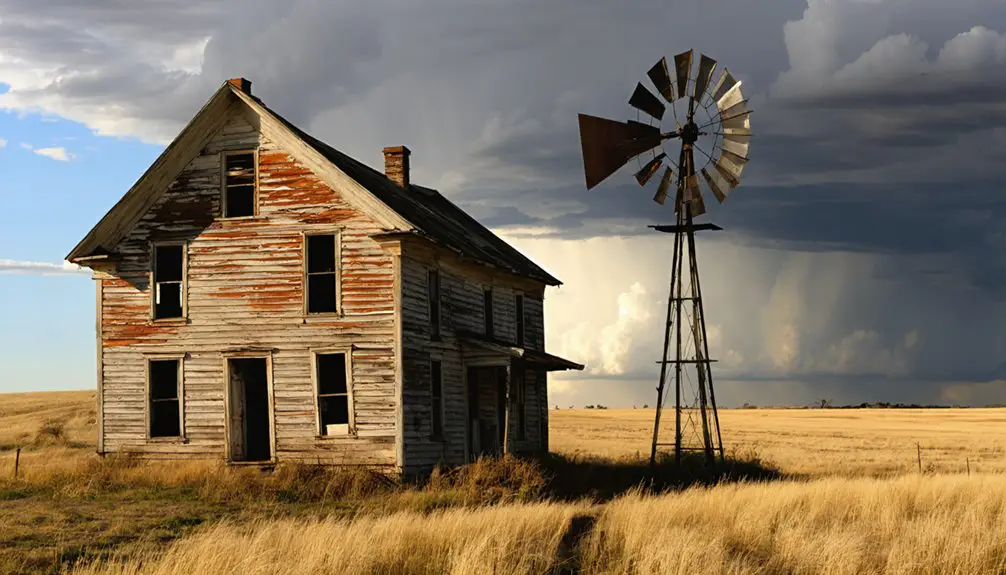You’ll find Eden Valley, Nebraska as a ghost town in Pierce County, where German immigrants built their dreams in the late 1800s. Their community flourished around the Assumption Church, dedicated in 1894, which became the heart of local life with its beautiful Bavarian altars and active parish. Though a devastating 1900 windstorm destroyed the original church, the settlers rebuilt it – a proof of their resilience. Today, only the cemetery remains, holding stories of pioneering spirit and determination.
Key Takeaways
- Eden Valley was established by German settlers in Nebraska’s Pierce County during the late 19th century around a Catholic church.
- The original church, built in 1891, was destroyed by a violent windstorm in 1900 but was rebuilt through community effort.
- Environmental challenges, including water scarcity and declining agriculture, contributed to the community’s gradual abandonment.
- The settlement now exists as a ghost town, with only the cemetery remaining as a testament to its immigrant history.
- The site represents the broader story of Great Plains settlement and demonstrates the transient nature of rural communities.
Origins of a German Settlement
Many German settlers made their way to Nebraska in the years following Omaha’s founding in 1854, driven by the political upheaval of the 1848 revolutions in their homeland.
Mass immigration began in the 1860s as Germans established themselves in the region, building churches and businesses throughout the area.
These pioneers established vibrant communities, bringing with them cultural traditions that would shape Nebraska’s landscape.
Some came directly from German states, while others traced their journey through Russia’s Volga River region, where their ancestors had settled under Catherine the Great’s promises of religious freedom and military exemption.
The newcomers maintained strong ties to their heritage through Low German dialects, as documented among German-speaking settlers in neighboring Kansas.
The Heart of Eden Valley: A Pioneering Church
On December 4, 1894, the dedication of Assumption Church marked a pivotal moment in Eden Valley’s history, as Bishop Otto Sardetti blessed what would become the spiritual cornerstone of this growing German Catholic community.
You’d have found a vibrant parish life centered around community gatherings and spiritual leadership, with the church bell from Popple Bush Church ringing out across the prairie. Like the early Catholic settlers in Cedar County, these pioneers experienced spiritual conflicts with church governance.
Under Father Peter Gruenes‘s guidance, the parish flourished, growing to rival neighboring congregations in Luxemburg and New Munich. The church’s beauty was enhanced by hand-carved main altars imported from Bavaria.
The Benedictine Sisters established a parochial school that educated local children for over 70 years, with a dedicated house built for ten nuns in 1926.
Even after the school’s closure in 1971, Assumption Church remained a tribute to the pioneering spirit of Eden Valley’s faithful settlers.
Natural Disaster Strikes
While Eden Valley’s pioneers had worked tirelessly to establish their new community, nature would soon test their resolve. In 1900, just one year after German settlers built their cherished church, a violent windstorm ravaged the structure, forcing the community to rebuild from scratch. The settlers established a thriving band in 1927 that persisted through difficult times.
You can imagine the devastating natural disaster impacts on this fledgling settlement, where wooden buildings stood vulnerable against Nebraska’s fierce weather patterns. Like the Financial Panic of 1857, which devastated communities across the region, natural disasters could trigger rapid economic decline.
Yet the story of Eden Valley’s response demonstrates remarkable community resilience. The settlers immediately rallied to construct a new church, though this rebuilding effort strained their limited resources.
Unfortunately, this destructive event marked the beginning of gradual decline, as repeated battles against severe weather and the economic burden of reconstruction eventually led many residents to seek more stable environments elsewhere.
Cultural Heritage and Community Life
The German settlers who founded Eden Valley brought their strong religious traditions with them, establishing the community’s first church in 1891 as a cornerstone of local life.
You’ll find evidence of their determined faith in how quickly they rebuilt after the 1900 windstorm destroyed their original church building, demonstrating the resilience that defined frontier settlements. Like many railroad-era communities, Eden Valley sprung up during the great westward expansion of the 1870s and 1880s. Today, similar community spirit is evident along State Street, where residents gather to enjoy festive holiday decorations and support local businesses.
While the church formed the spiritual center, the community’s social fabric extended through school activities, band performances, and shared cultural celebrations that kept Eden Valley’s German heritage alive until its eventual abandonment.
German Religious Traditions
German religious traditions flourished in Eden Valley through the Missouri Synod Lutheran community, which maintained strong cultural ties to their homeland after settling in Nebraska between 1861-1865.
You’d find German hymns resonating through St. Paul’s Lutheran Church, where services and religious instruction were conducted entirely in German. The congregation became part of the Missouri Synod movement, which established eight affiliated churches across Seward County. Religious festivals marked important dates in the Lutheran calendar, bringing families together for worship and celebration.
World War I changed everything. By 1917, anti-German sentiment forced the community to abandon their German-language services and close their parochial schools.
While they continued practicing their Lutheran faith, they’d to conduct services in English to avoid suspicion and demonstrate their loyalty. Despite these pressures, the community preserved many of their cherished religious customs, adapting them to their new American context.
Frontier Settlement Social Life
Life on Eden Valley’s frontier revolved around vibrant social gatherings that knit the community together through shared labor and celebration.
You’d find neighbors coming together for seasonal barn raisings, harvest festivals, and quilting bees that strengthened community bonds while accomplishing essential work. The local schoolhouse served as more than just a place of learning – it transformed into a hub for dances, religious services, and town meetings. Many settlers were German and Scandinavian immigrants who brought their cultural traditions to these community gatherings.
When times got tough, mutual aid societies stepped in to help those facing illness, crop failures, or natural disasters.
Potluck dinners and local fairs weren’t just social events; they were opportunities to trade goods, share news, and maintain the connections that helped the settlement thrive.
Through these gatherings, Eden Valley’s residents created a support network that sustained their pioneering spirit.
Environmental Challenges in the Great Plains
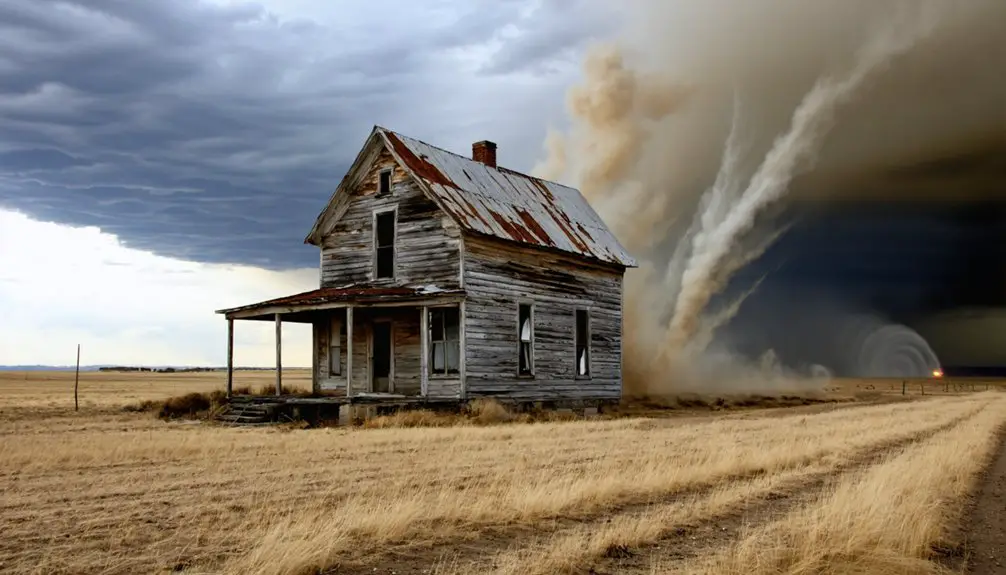
While settlers initially viewed the Great Plains as an endless expanse of agricultural promise, today’s environmental challenges paint a stark picture of resource depletion and ecological transformation.
You’ll find the once-abundant Ogallala aquifer rapidly declining, with water scarcity threatening both farming operations and drinking supplies across the region. The conversion of native grasslands to cropland has accelerated habitat loss, pushing wildlife populations to the brink.
Consider these sobering changes since the frontier era:
- Water levels have dropped over 250 feet in some areas since 1950
- Two million acres of grassland vanish yearly to row crops
- Over 80% of grassland songbirds have disappeared since 1960
The land your ancestors once celebrated as limitless now faces constraints that would’ve been unimaginable to early settlers.
Historical Significance and Legacy
Founded in the late 19th century, Eden Valley emerged as a tribute to immigrant determination and community spirit in Nebraska’s Pierce County.
You’ll find its legacy preserved in the stories of German settlers who built their dreams around a church established in 1891 and rebuilt after nature’s fury in 1900.
The town’s historical preservation centers on cultural touchstones that shaped its community identity: the fourth school in the Plainview region, a cherished church with its 1909 parsonage, and a resilient town band formed in 1927.
Though Eden Valley’s physical presence has faded into a ghost town, its cemetery stands as a memorial to the pioneering spirit of rural Nebraska.
The town’s story reflects a broader narrative of immigrant communities that once dotted the Great Plains, leaving an indelible mark on America’s heartland.
Frequently Asked Questions
Are There Any Remaining Grave Sites or Cemeteries in Eden Valley Today?
You’ll find the historic cemetery with visible grave markers still standing, supported by burial records, as one of the last physical remnants of this once-thriving pioneer community’s legacy.
What Happened to the Original German Families After Leaving Eden Valley?
You’d think these German families vanished, but they actually thrived, spreading their legacy across the Midwest, especially to Omaha, where they built churches, businesses, and maintained their cultural traditions.
Were There Any Businesses or Stores Operating Besides the Church?
You won’t find evidence of any general store or local services in the records – the church stood alone as the settlement’s only documented establishment besides the community school.
Did Eden Valley Have a School System During Its Brief Existence?
You’ll find a rich school history here – they established the area’s fourth school, which moved twice before getting a new building. Their education structure served students until permanently closing in 1963.
What Was the Peak Population of Eden Valley Before Its Abandonment?
You’ll find no exact peak population records, but comparing similar rural towns’ peak growth patterns and population decline, historians estimate it likely housed between 200-500 residents before gradually emptying out.
References
- https://history.nebraska.gov/wp-content/uploads/2017/12/doc_publications_NH1937GhostTowns.pdf
- https://www.youtube.com/watch?v=redtU6GT-BY
- https://visitnebraska.com/trip-idea/explore-7-authentic-ghost-towns-nebraska
- https://www.ghosttowns.com/states/ne/edenvalley.html
- https://minnesotasnewcountry.com/bah-humbug-there-seems-to-be-a-grinch-roaming-eden-valley/
- https://en.wikipedia.org/wiki/Germans_in_Omaha
- https://digitalcommons.fairfield.edu/cgi/viewcontent.cgi?article=1003&context=library-pubs
- https://mki.wisc.edu/german-american-resources-at-the-max-kade-institute-creators-t-through-z/
- https://www.grand-island.com/page/the-pioneer-spirit
- https://www.churchoftheassumptionedenvalley.org/church-history
